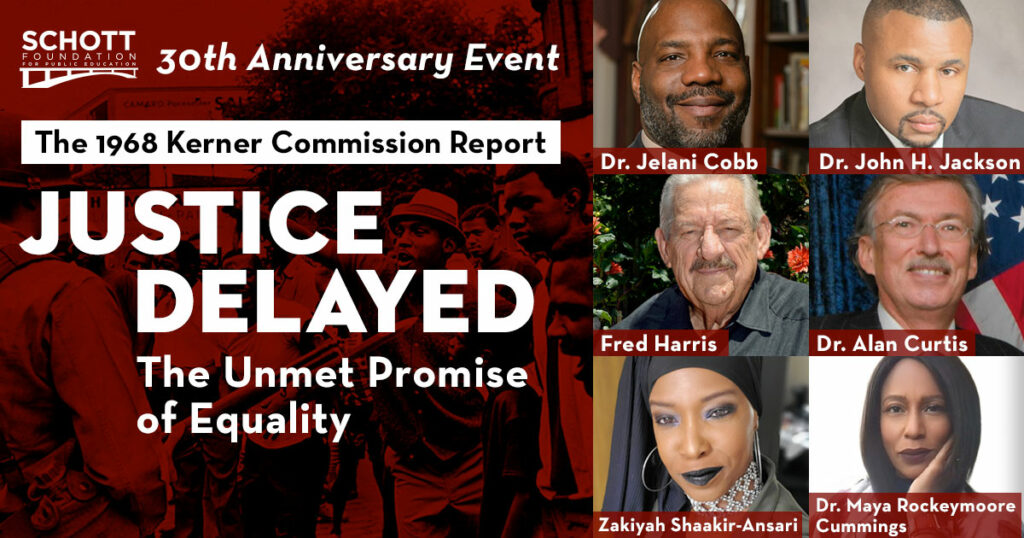Blog
Justice Delayed: The Unmet Promise of Equality

Schott kicks off its 30th anniversary year with a thought-provoking look at the Kerner Commission’s dramatic 1968 report calling out systemic racism — boldly stating it was not a lack of solutions that distances our nation from justice, but the lack of public will to implement them. The education and racial justice movement is building power, forging public will for change. What role will philanthropy play to support them in this justice moment?
Speakers:
- Dr. Jelani Cobb, Editor, The Essential Kerner Commission Report; Staff Writer, New Yorker; Professor, Columbia School of Journalism
- Dr. John H. Jackson, President and CEO, Schott Foundation
- Fred Harris, the sole-surviving member of the Kerner Commission, a driving force behind the Commission’s truth-telling
- Zakiyah Shaakir-Ansari, Advocacy Director & New York City Director, Alliance for Quality Education
- Dr. Alan Curtis, President, Milton Eisenhower Foundation
- Dr. Maya Rockeymoore Cummings, President, Global Policy Solutions, Moderator
Watch the full Livestream event here:
Moderator Dr. Maya Rockeymoore Cummings, president of Global Policy Solutions, opened the discussion by recounting the events that spurred the Kerner Commission’s creation: “In the summer of 1967, twenty-three cities across the country erupted in protests. Most of them were sparked by responses to police actions in Black neighborhoods, each eruption was like lighting a match to the already very dry tinder of inequality, injustice, denied opportunities, and growing frustration at the chasm between the seemingly bright promise of America’s slogans and the dark reality and impoverished segregated communities of color.”
Schott President & CEO Dr. Jackson detailed the important truths the Kerner report told, and described the role philanthropy must play moving forward: “the highest return for philanthropy dollars at this moment is to accelerate public investments focused on equity and racial justice… Investing in and empowering grassroots change organizations is also necessary, reinforcing a virtuous cycle.”
Former U.S. Senator Fred Harris, who was a member of the Kerner Commission, retold the heartbreaking scenes of poverty and discrimination he and others witnessed as the commission conducted its research across the country. “Great and sustained national efforts were required,” he concluded, “not only to combat racism and decrease police violence in communities of color, but also to significantly expand social programs, including those against unemployment and low wages, poverty, inferior or inadequate education and training, lack of health care, and bad or nonexistent housing.”
- Dr. Jelani Cobb brought the insights of the report to our present conditions, emphasizing how interconnected seemingly separate social problems are. “I think this is one of the most valuable insights that the Kerner Commission Report delivered, in looking at everything from housing, to employment, to education, to the way the media even reported on all these problems.”
- Milton Eisenhower Foundation President Dr. Alan Curtis gave us a close look at the policy legacy of the report’s recommendations, concluding that what is needed in education is “racial integration in public schools, much more equitable financing of public schools, greatly improved training of public school teachers, significant expansion of public community schools and an end to the school-to-prison pipeline.”
- Zakiyah Shaakir-Ansari of the Alliance for Quality Education (AQE) shared her experiences building the kind of grassroots, community-centered organizing that’s needed to make transformative change. AQE’s decades-long push to equitably fund public schools was won early last year and serves as inspiration for communities across the nation. “We are still fighting this inequity,” she said. “Support organizations out there, youth organizations and others listen to the voices of parents, students, and community members.”


